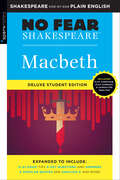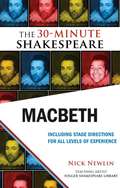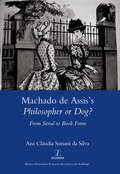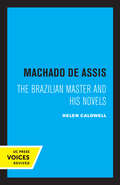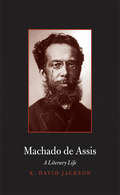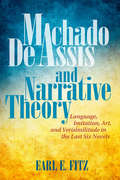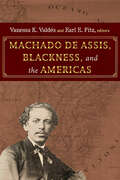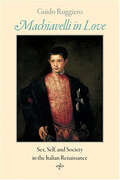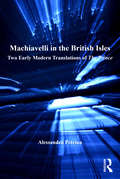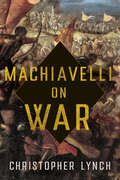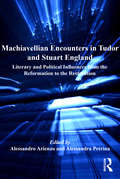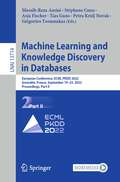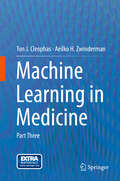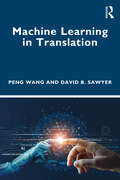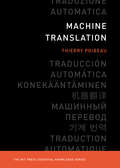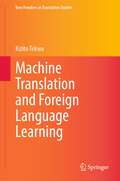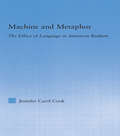- Table View
- List View
Macbeth: No Fear Shakespeare Deluxe Student Editions - Shakespeare Side-by-Side Plain English (No Fear Shakespeare)
by William Shakespeare SparkNotesShakespeare everyone can understand—now in this new EXPANDED edition of MACBETH! Why fear Shakespeare? By placing the words of the original play next to line-by-line translations in plain English, this popular guide makes Shakespeare accessible to everyone. And now it features expanded literature guide sections that help students study smarter. The expanded sections include: Five Key Questions: Five frequently asked questions about major moments and characters in the play. What Does the Ending Mean?: Is the ending sad, celebratory, ironic . . . or ambivalent? Plot Analysis: What is the play about? How is the story told, and what are the main themes? Why do the characters behave as they do? Study Questions: Questions that guide students as they study for a test or write a paper. Quotes by Theme: Quotes organized by Shakespeare&’s main themes, such as love, death, tyranny, honor, and fate. Quotes by Character: Quotes organized by the play&’s main characters, along with interpretations of their meaning.
Macbeth: The 30-Minute Shakespeare
by Nick NewlinPlanning a school or amateur Shakespeare production? The best way to experience the plays is to perform them, but getting started can be a challenge: The complete plays are too long and complex, while scene selections or simplified language are too limited."The 30-Minute Shakespeare" is a new series of abridgements that tell the "story" of each play from start to finish while keeping the beauty of Shakespeare's language intact. Specific stage directions and character suggestions give even inexperienced actors the tools to perform Shakespeare with confidence, understanding, and fun!This cutting of MACBETH is edited to seven key scenes, opening with the Weird Sisters predicting Macbeth's fate. Also included are Macbeth and his villainous wife plotting to murder King Duncan, the appearance of Banquo's ghost at the banquet, the Witches' unforgettable "double double toil and trouble" scene, and Lady Macbeth's riveting "out, damned spot" sleepwalk. In the finale, the entire cast recites Macbeth's poignant "tomorrow, tomorrow, and tomorrow" speech in unison.The edition also includes an essay by editor Nick Newlin on how to produce a Shakespeare play with novice actors, and notes about the original production of this abridgement at the Folger Shakespeare Library's annual Student Shakespeare Festival.
Machado De Assis's Philosopher or Dog?: From Serial to Book Form
by Surianida SilvaThe great Brazilian writer Joaquim Maria Machado de Assis (1839-1908) published five of his nine novels as feuilletons in daily newspapers or fortnightly women's magazines. How were the structure and themes of those novels entangled with this serial-publication form? In da Silva's important new study, textual scholarship, critical theory and the history of the book are combined in order to trace this relationship. The most important case study is an extended consideration of Philosopher or Dog? (1891), the novel after which he abandoned the feuilleton. Through a comparison of the serial and book versions of Philosopher or Dog? and a thorough study of the periodical in which it appeared, the international women's magazine The Season , da Silva analyses the changes which the genre novel was undergoing at the end of the nineteenth century: the decline of the serial, and the standardisation of female press. Ana Claudia Suriani da Silva is Tutor of Portuguese at the University of Birmingham and Honorary Research Fellow at Birkbeck College, University of London.
Machado De Assis: The Brazilian Master and His Novels
by Helen CaldwellMachado de Assis is among the most original creative minds in Brazil's rich, four-century-long literary tradition. Caldwell's critical and biographical study explores Machado's purpose, meaning, and artistic method in each of his nine novels, published between 1872 and 1908. She traces the ideas and recurrent themes, and identifies his affinities with other authors. In tracing Machado's experimentation with narrative techniques, Caldwell reveals the increasingly subtle use he made of point of view, sometimes indirect or reflected, sometimes multiple and "nested" like Chinese boxes. Caldwell shows the increasing sureness with which he individualized his characters, and how, in advance of his time, he developed action, not by realistic detail, but by the boldest use of allusion and symbol. Each novel is shown to be an artistic venture, and not in any sense a regurgitation from a sick soul as some critics have argued. IN searching out the unity of his novels, Caldwell explores the other aspects of Machado's intellectual life--as poet,journalist, playwright, conversationalist, and academician. Of particular interest is her attention to his shift away from the social criticism of his early novels into the labyrinth of individual psychology in the last five--all of which rank among the world literature. But this perceptive account never loses sight of the one element present in every piece of Machado's fiction, in eery one of his personages; that is, superlative comedy, in its whole range: wit, irony, satire, parody, burlesque, humor. Altogether, Caldwell reveals to us a writer, in essence a poet, who is still the altus prosator of Brazilian letters. This title is part of UC Press's Voices Revived program, which commemorates University of California Press's mission to seek out and cultivate the brightest minds and give them voice, reach, and impact. Drawing on a backlist dating to 1893, Voices Revived makes high-quality, peer-reviewed scholarship accessible once again using print-on-demand technology. This title was originally published in 1970.
Machado de Assis
by K. David JacksonNovelist, poet, playwright, and short story writer Joaquim Maria Machado de Assis (1839-1908) is widely regarded as Brazil's greatest writer, although his work is still too little read outside his native country. In this first comprehensive English-language examination of Machado since Helen Caldwell's seminal 1970 study, K. David Jackson reveals Machado de Assis as an important world author, one of the inventors of literary modernism whose writings profoundly influenced some of the most celebrated authors of the twentieth century, including José Saramago, Carlos Fuentes, and Donald Barthelme. Jackson introduces a hitherto unknown Machado de Assis to readers, illuminating the remarkable life, work, and legacy of the genius whom Susan Sontag called "the greatest writer ever produced in Latin America" and whom Allen Ginsberg hailed as "another Kafka. " Philip Roth has said of him that "like Beckett, he is ironic about suffering. " And Harold Bloom has remarked of Machado that "he's funny as hell. "
Machado de Assis and Narrative Theory: Language, Imitation, Art, and Verisimilitude in the Last Six Novels (Bucknell Studies in Latin American Literature and Theory)
by Earl E. FitzThis book makes the argument that Machado de Assis, hailed as one of Latin American literature’s greatest writers, was also a major theoretician of the modern novel form. Steeped in the works of Western literature and an imaginative reader of French Symbolist poetry, Machado creates, between 1880 and 1908, a “new narrative,” one that will presage the groundbreaking theories of Swiss linguist Ferdinand de Saussure by showing how even the language of narrative cannot escape being elusive and ambiguous in terms of meaning. It is from this discovery about the nature of language as a self-referential semiotic system that Machado crafts his “new narrative.” Long celebrated in Brazil as a dazzlingly original writer, Machado has struggled to gain respect and attention outside the Luso-Brazilian ken. He is the epitome of the “outsider” or “marginal,” the iconoclastic and wildly innovative genius who hails from a culture rarely studied in the Western literary hierarchy and so consigned to the status of “eccentric.” Had the Brazilian master written not in Portuguese but English, French, or German, he would today be regarded as one of the true exemplars of the modern novel, in expression as well as in theory. Published by Bucknell University Press. Distributed worldwide by Rutgers University Press.
Machado de Assis, Blackness, and the Americas (SUNY series, Afro-Latinx Futures)
by Vanessa K. Valdés; Earl E. FitzConsidered a genius in his own lifetime, Joaquim Maria Machado de Assis (1839–1908) is Brazil's most canonized writer. Yet, he remains a contested and even enigmatic figure to readers in Brazil and abroad, his relative silence on slavery leaving him vulnerable to charges of aspirations to whiteness. Machado de Assis, Blackness, and the Americas reconsiders this issue by exploring how his prose fiction has been received in the United States. In seven original essays, contributors re-examine his novels and short stories, as well as photographs of the writer, in order to better understand the strategies he employed to navigate Brazil's literary scene as a man of African descent. Framed by a contextualizing introduction and an afterword in the form of a conversation between the editors, the volume speaks to and with our own historical moment and the realities of Black lives in the Americas over the course of the last two centuries.
Machiavelli in Love: Sex, Self, and Society in the Italian Renaissance
by Guido RuggieroA “provocative” study of sex and sexual identity in Renaissance Italy, explored through major literary works and historical archives (Choice).Machiavelli in Love introduces a complex concept of sex and sexual identity and their roles in the culture and politics of the Italian Renaissance. Guido Ruggiero’s study counters the consensus among historians and literary critics that there was little sense of individual identity and almost no sense of sexual identity before the modern period.Drawing from the works of major literary figures such as Boccaccio, Aretino, and Castiglione, and rereading them against archival evidence, Ruggiero examines the concept of identity via consensus realities of family, neighbors, friends, and social peers, as well as broader communities and solidarities. The author contends that Renaissance Italians understood sexual identity as a part of the human life cycle, something that changed throughout stages of youthful experimentation, marriage, adult companionship, and old age.Machiavelli’s letters and literary production reveal a fascinating construction of self that is highly reliant on sexual reputation. Ruggiero’s challenging reinterpretation of this canonical figure, as well as his unique treatment of other major works of the period, offer new approaches for reading Renaissance literature and new understandings of the way life was lived and perceived during this time.
Machiavelli in the British Isles: Two Early Modern Translations of The Prince (Anglo-Italian Renaissance Studies)
by Alessandra PetrinaMachiavelli in the British Isles reassesses the impact of Machiavelli's The Prince in sixteenth-century England and Scotland through the analysis of early English translations produced before 1640, surviving in manuscript form. This study concentrates on two of the four extant sixteenth-century versions: William Fowler's Scottish translation and the Queen's College (Oxford) English translation, which has been hitherto overlooked by scholars. Alessandra Petrina begins with an overview of the circulation and readership of Machiavelli in early modern Britain before focusing on the eight surviving manuscripts. She reconstructs each manuscript's history and the afterlife of the translations before moving to a detailed examination of two of the translations. Petrina's investigation of William Fowler's translation takes into account his biography, in order to understand the Machiavellian influence on early modern political thought. Her study of the Queen's College translation analyses the manuscript's provenance as well as technical details including writing and paper quality. Importantly, this book includes annotated editions of both translations, which compare the texts with the original Italian versions as well as French and Latin versions. With this volume Petrina has compiled an important reference source, offering easy access to little-known translations and shedding light on a community of readers and scholars who were fascinated by Machiavelli, despite political or religious opinion.
Machiavelli on War
by Christopher LynchMachiavelli on War offers a comprehensive interpretation of the philosopher-historian's treatment of war throughout his writings, from poems and memoranda drafted while he was Florence's top official for military matters to his posthumous works, The Prince and Discourses on Livy. Christopher Lynch argues that the issue of war permeates the form and content of each of Machiavelli's works, the substance of his thoughts, and his own activity as a writer, concluding that he was the first great modern philosopher because he was the first modern philosopher of war.Lynch details Machiavelli's understanding of warfare in terms of both actual armed conflict and at the intellectual level of thinkers competing on the field of knowledge and belief. Throughout Machiavelli's works, he focuses on how military commanders' knowledge of human necessities, beginning with their own, enables and requires them to mold soldiers, organizationally and politically, to best deploy them in operations attuned to political context and changing circumstances. Intellectually, leaders must shape minds, their own and others', to reject beliefs that would weaken their purpose; for Machiavelli, this meant overcoming the classical and Christian traditions in favor of a new teaching of human freedom and excellence. As Machiavelli on War makes clear, prevailing both on the battlefield and in the war of ideas demands a single-minded engagement in "reasoning about everything," beginning with oneself. For Machiavelli, Lynch shows, the successful military commander is not just an excellent leader but also an excellent human being in constant pursuit of the truth about themselves and the world.
Machiavellian Encounters in Tudor and Stuart England: Literary and Political Influences from the Reformation to the Restoration (Anglo-Italian Renaissance Studies)
by Alessandro ArienzoTaking into consideration the political and literary issues hanging upon the circulation of Machiavelli's works in England, this volume highlights how topics and ideas stemming from Machiavelli's books - including but not limited to the Prince - strongly influenced the contemporary political debate. The first section discusses early reactions to Machiavelli's works, focusing on authors such as Reginald Pole and William Thomas, depicting their complex interaction with Machiavelli. In section two, different features of Machiavelli's reading in Tudor literary and political culture are discussed, moving well beyond the traditional image of the tyrant or of the evil Machiavel. Machiavelli's historiography and republicanism and their influences on Tudor culture are discussed with reference to topical authors such as Walter Raleigh, Alberico Gentili, Philip Sidney; his role in contemporary dramatic writing, especially as concerns Christopher Marlowe and William Shakespeare, is taken into consideration. The last section explores Machiavelli's influence on English political culture in the seventeenth century, focusing on reason of state and political prudence, and discussing writers such as Henry Parker, Marchamont Nedham, James Harrington, Thomas Hobbes and Anthony Ascham. Overall, contributors put Machiavelli's image in sixteenth- and seventeenth-century England into perspective, analyzing his role within courtly and prudential politics, and the importance of his ideological proposal in the tradition of republicanism and parliamentarianism.
Machine Learning and Knowledge Discovery in Databases: European Conference, ECML PKDD 2022, Grenoble, France, September 19–23, 2022, Proceedings, Part II (Lecture Notes in Computer Science #13714)
by Massih-Reza Amini Petra Kralj Novak Grigorios Tsoumakas Stéphane Canu Asja Fischer Tias GunsThe multi-volume set LNAI 13713 until 13718 constitutes the refereed proceedings of the European Conference on Machine Learning and Knowledge Discovery in Databases, ECML PKDD 2022, which took place in Grenoble, France, in September 2022.The 236 full papers presented in these proceedings were carefully reviewed and selected from a total of 1060 submissions. In addition, the proceedings include 17 Demo Track contributions. The volumes are organized in topical sections as follows: Part I: Clustering and dimensionality reduction; anomaly detection; interpretability and explainability; ranking and recommender systems; transfer and multitask learning; Part II: Networks and graphs; knowledge graphs; social network analysis; graph neural networks; natural language processing and text mining; conversational systems; Part III: Deep learning; robust and adversarial machine learning; generative models; computer vision; meta-learning, neural architecture search; Part IV: Reinforcement learning; multi-agent reinforcement learning; bandits and online learning; active and semi-supervised learning; private and federated learning; . Part V: Supervised learning; probabilistic inference; optimal transport; optimization; quantum, hardware; sustainability; Part VI: Time series; financial machine learning; applications; applications: transportation; demo track.
Machine Learning in Medicine
by Aeilko H. Zwinderman Ton J. CleophasMachine learning is a novel discipline concerned with the analysis of large and multiple variables data. It involves computationally intensive methods, like factor analysis, cluster analysis, and discriminant analysis. It is currently mainly the domain of computer scientists, and is already commonly used in social sciences, marketing research, operational research and applied sciences. It is virtually unused in clinical research. This is probably due to the traditional belief of clinicians in clinical trials where multiple variables are equally balanced by the randomization process and are not further taken into account. In contrast, modern computer data files often involve hundreds of variables like genes and other laboratory values, and computationally intensive methods are required. This book was written as a hand-hold presentation accessible to clinicians, and as a must-read publication for those new to the methods.
Machine Learning in Translation
by Peng Wang David B. SawyerMachine Learning in Translation introduces machine learning (ML) theories and technologies that are most relevant to translation processes, approaching the topic from a human perspective and emphasizing that ML and ML-driven technologies are tools for humans. Providing an exploration of the common ground between human and machine learning and of the nature of translation that leverages this new dimension, this book helps linguists, translators, and localizers better find their added value in a ML-driven translation environment. Part One explores how humans and machines approach the problem of translation in their own particular ways, in terms of word embeddings, chunking of larger meaning units, and prediction in translation based upon the broader context. Part Two introduces key tasks, including machine translation, translation quality assessment and quality estimation, and other Natural Language Processing (NLP) tasks in translation. Part Three focuses on the role of data in both human and machine learning processes. It proposes that a translator’s unique value lies in the capability to create, manage, and leverage language data in different ML tasks in the translation process. It outlines new knowledge and skills that need to be incorporated into traditional translation education in the machine learning era. The book concludes with a discussion of human-centered machine learning in translation, stressing the need to empower translators with ML knowledge, through communication with ML users, developers, and programmers, and with opportunities for continuous learning. This accessible guide is designed for current and future users of ML technologies in localization workflows, including students on courses in translation and localization, language technology, and related areas. It supports the professional development of translation practitioners, so that they can fully utilize ML technologies and design their own human-centered ML-driven translation workflows and NLP tasks.
Machine Translation (The MIT Press Essential Knowledge series)
by Thierry PoibeauA concise, nontechnical overview of the development of machine translation, including the different approaches, evaluation issues, and major players in the industry.The dream of a universal translation device goes back many decades, long before Douglas Adams's fictional Babel fish provided this service in The Hitchhiker's Guide to the Galaxy. Since the advent of computers, research has focused on the design of digital machine translation tools—computer programs capable of automatically translating a text from a source language to a target language. This has become one of the most fundamental tasks of artificial intelligence. This volume in the MIT Press Essential Knowledge series offers a concise, nontechnical overview of the development of machine translation, including the different approaches, evaluation issues, and market potential. The main approaches are presented from a largely historical perspective and in an intuitive manner, allowing the reader to understand the main principles without knowing the mathematical details. The book begins by discussing problems that must be solved during the development of a machine translation system and offering a brief overview of the evolution of the field. It then takes up the history of machine translation in more detail, describing its pre-digital beginnings, rule-based approaches, the 1966 ALPAC (Automatic Language Processing Advisory Committee) report and its consequences, the advent of parallel corpora, the example-based paradigm, the statistical paradigm, the segment-based approach, the introduction of more linguistic knowledge into the systems, and the latest approaches based on deep learning. Finally, it considers evaluation challenges and the commercial status of the field, including activities by such major players as Google and Systran.
Machine Translation and Foreign Language Learning (New Frontiers in Translation Studies)
by Kizito TekwaThe book investigates how machine translation (MT) provides opportunities and increases the willingness to communicate in a foreign language. It is informed by a mixed methods methodological approach that analyzes quantitative and qualitative data of questionnaires and real-time instant messages (IM). The book is unique because it contains tables, figures, and screenshots of actual real-time IM exchanges. It is innovative in discussing IM translation, a novel form of MT, and demonstrates how the technology offers English foreign language learners, in this case, Chinese college students, communication opportunities while increasing their willingness to communicate. The study provides an interesting insight into IM user profiles, clients, and usages. Smartphone screenshots are the locale of the study whose findings have far-reaching implications for students, language and translation instructors, and curriculum designers.
Machine and Metaphor: The Ethics of Language in American Realism (Literary Criticism and Cultural Theory)
by Jennifer C. CookAmerican literary realism burgeoned during a period of tremendous technological innovation. Because the realists evinced not only a fascination with this new technology but also an ethos that seems to align itself with science, many have paired the two fields rather unproblematically. But this book demonstrates that many realist writers, from Mark Twain to Stephen Crane, Charles W. Chesnutt to Edith Wharton, felt a great deal of anxiety about the advent of new technologies – precisely at the crucial intersection of ethics and language. For these writers, the communication revolution was a troubling phenomenon, not only because of the ways in which the new machines had changed and increased the circulation of language but, more pointedly, because of the ways in which language itself had effectively become a machine: a vehicle perpetuating some of society’s most pernicious clichés and stereotypes – particularly stereotypes of race – in unthinking iteration. This work takes a close look at how the realists tried to forge an ethical position between the two poles of science and sentimentality, attempting to create an alternative mode of speech that, avoiding the trap of codifying iteration, could enable ethical action.
Machines of the Mind: Personification in Medieval Literature
by Katharine BreenIn Machines of the Mind, Katharine Breen proposes that medieval personifications should be understood neither as failed novelistic characters nor as instruments of heavy-handed didacticism. She argues that personifications are instead powerful tools for thought that help us to remember and manipulate complex ideas, testing them against existing moral and political paradigms. Specifically, different types of medieval personification should be seen as corresponding to positions in the rich and nuanced medieval debate over universals. Breen identifies three different types of personification—Platonic, Aristotelian, and Prudentian—that gave medieval writers a surprisingly varied spectrum with which to paint their characters. Through a series of new readings of major authors and works, from Plato to Piers Plowman, Breen illuminates how medieval personifications embody the full range of positions between philosophical realism and nominalism, varying according to the convictions of individual authors and the purposes of individual works. Recalling Gregory the Great’s reference to machinae mentis (machines of the mind), Breen demonstrates that medieval writers applied personification with utility and subtlety, employing methods of personification as tools that serve different functions. Machines of the Mind offers insight for medievalists working at the crossroads of religion, philosophy, and literature, as well as for scholars interested in literary character-building and gendered relationships among characters, readers, and texts beyond the Middle Ages.
Machines of the Mind: Personification in Medieval Literature
by Katharine BreenIn Machines of the Mind, Katharine Breen proposes that medieval personifications should be understood neither as failed novelistic characters nor as instruments of heavy-handed didacticism. She argues that personifications are instead powerful tools for thought that help us to remember and manipulate complex ideas, testing them against existing moral and political paradigms. Specifically, different types of medieval personification should be seen as corresponding to positions in the rich and nuanced medieval debate over universals. Breen identifies three different types of personification—Platonic, Aristotelian, and Prudentian—that gave medieval writers a surprisingly varied spectrum with which to paint their characters. Through a series of new readings of major authors and works, from Plato to Piers Plowman, Breen illuminates how medieval personifications embody the full range of positions between philosophical realism and nominalism, varying according to the convictions of individual authors and the purposes of individual works. Recalling Gregory the Great’s reference to machinae mentis (machines of the mind), Breen demonstrates that medieval writers applied personification with utility and subtlety, employing methods of personification as tools that serve different functions. Machines of the Mind offers insight for medievalists working at the crossroads of religion, philosophy, and literature, as well as for scholars interested in literary character-building and gendered relationships among characters, readers, and texts beyond the Middle Ages.
Machines of the Mind: Personification in Medieval Literature
by Katharine BreenIn Machines of the Mind, Katharine Breen proposes that medieval personifications should be understood neither as failed novelistic characters nor as instruments of heavy-handed didacticism. She argues that personifications are instead powerful tools for thought that help us to remember and manipulate complex ideas, testing them against existing moral and political paradigms. Specifically, different types of medieval personification should be seen as corresponding to positions in the rich and nuanced medieval debate over universals. Breen identifies three different types of personification—Platonic, Aristotelian, and Prudentian—that gave medieval writers a surprisingly varied spectrum with which to paint their characters. Through a series of new readings of major authors and works, from Plato to Piers Plowman, Breen illuminates how medieval personifications embody the full range of positions between philosophical realism and nominalism, varying according to the convictions of individual authors and the purposes of individual works. Recalling Gregory the Great’s reference to machinae mentis (machines of the mind), Breen demonstrates that medieval writers applied personification with utility and subtlety, employing methods of personification as tools that serve different functions. Machines of the Mind offers insight for medievalists working at the crossroads of religion, philosophy, and literature, as well as for scholars interested in literary character-building and gendered relationships among characters, readers, and texts beyond the Middle Ages.
Macmillan English 9: Thinking And Writing Processes
by Simon & Schuster Books For Young ReadersMacmillan English 9 Thinking and Writing Process Thinking and writing go hand in hand. Thinking is built into each stage of the writing process, and writing itself can be a tool of the thinking process. As you progress through this textbook, you will discover how applying certain thinking skills can help you become a better writer. Each unit in Macmillan English opens with a special feature called “Thinking About Thinking.” This feature defines one particular thinking skill that is part of a larger thinking process. Each skill is one you will find useful as you engage in the activities of that unit. “Thinking About Thinking” helps you to become aware of what you do when you think. Each feature asks you to think in a certain way about a photograph. By becoming more aware of the way you think, you can gain greater mastery of the thinking skills you use as you write. Here, in everyday language, are descriptions of the thinking skills you will apply at the start of each unit in this book.
Macmillan/McGraw-Hill Alabama Treasures [Grade 3 Book 1]
by Macmillan Mcgraw-HillNIMAC-sourced textbook
Macmillan/McGraw-Hill Alabama Treasures [Grade 3 Book 2]
by Macmillan Mcgraw-HillNIMAC-sourced textbook
